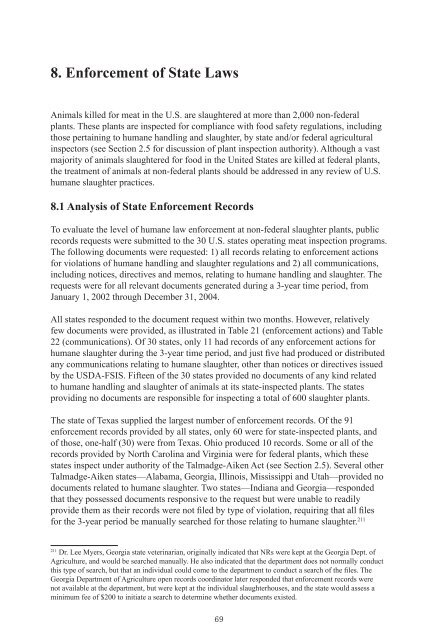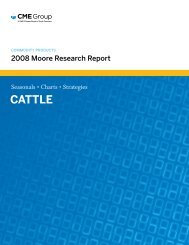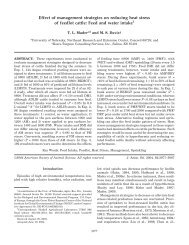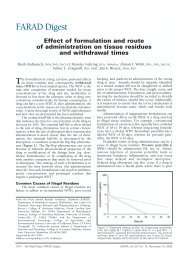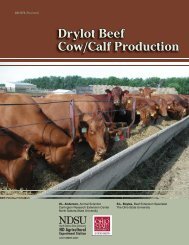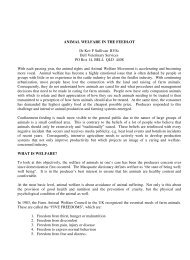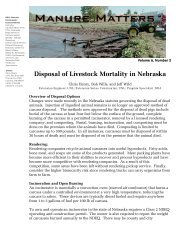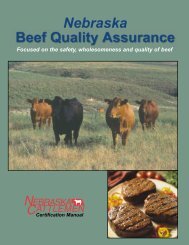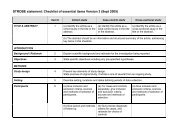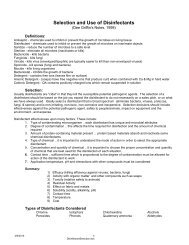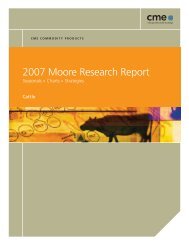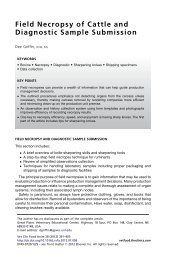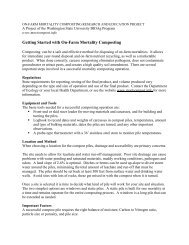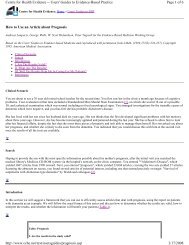CRIMES WITHOUT CONSEQUENCES - gpvec
CRIMES WITHOUT CONSEQUENCES - gpvec
CRIMES WITHOUT CONSEQUENCES - gpvec
Create successful ePaper yourself
Turn your PDF publications into a flip-book with our unique Google optimized e-Paper software.
8. Enforcement of State Laws<br />
Animals killed for meat in the U.S. are slaughtered at more than 2,000 non-federal<br />
plants. These plants are inspected for compliance with food safety regulations, including<br />
those pertaining to humane handling and slaughter, by state and/or federal agricultural<br />
inspectors (see Section 2.5 for discussion of plant inspection authority). Although a vast<br />
majority of animals slaughtered for food in the United States are killed at federal plants,<br />
the treatment of animals at non-federal plants should be addressed in any review of U.S.<br />
humane slaughter practices.<br />
8.1 Analysis of State Enforcement Records<br />
To evaluate the level of humane law enforcement at non-federal slaughter plants, public<br />
records requests were submitted to the 30 U.S. states operating meat inspection programs.<br />
The following documents were requested: 1) all records relating to enforcement actions<br />
for violations of humane handling and slaughter regulations and 2) all communications,<br />
including notices, directives and memos, relating to humane handling and slaughter. The<br />
requests were for all relevant documents generated during a 3-year time period, from<br />
January 1, 2002 through December 31, 2004.<br />
All states responded to the document request within two months. However, relatively<br />
few documents were provided, as illustrated in Table 21 (enforcement actions) and Table<br />
22 (communications). Of 30 states, only 11 had records of any enforcement actions for<br />
humane slaughter during the 3-year time period, and just five had produced or distributed<br />
any communications relating to humane slaughter, other than notices or directives issued<br />
by the USDA-FSIS. Fifteen of the 30 states provided no documents of any kind related<br />
to humane handling and slaughter of animals at its state-inspected plants. The states<br />
providing no documents are responsible for inspecting a total of 600 slaughter plants.<br />
The state of Texas supplied the largest number of enforcement records. Of the 91<br />
enforcement records provided by all states, only 60 were for state-inspected plants, and<br />
of those, one-half (30) were from Texas. Ohio produced 10 records. Some or all of the<br />
records provided by North Carolina and Virginia were for federal plants, which these<br />
states inspect under authority of the Talmadge-Aiken Act (see Section 2.5). Several other<br />
Talmadge-Aiken states—Alabama, Georgia, Illinois, Mississippi and Utah—provided no<br />
documents related to humane slaughter. Two states—Indiana and Georgia—responded<br />
that they possessed documents responsive to the request but were unable to readily<br />
provide them as their records were not filed by type of violation, requiring that all files<br />
for the 3-year period be manually searched for those relating to humane slaughter. 211<br />
211 Dr. Lee Myers, Georgia state veterinarian, originally indicated that NRs were kept at the Georgia Dept. of<br />
Agriculture, and would be searched manually. He also indicated that the department does not normally conduct<br />
this type of search, but that an individual could come to the department to conduct a search of the files. The<br />
Georgia Department of Agriculture open records coordinator later responded that enforcement records were<br />
not available at the department, but were kept at the individual slaughterhouses, and the state would assess a<br />
minimum fee of $200 to initiate a search to determine whether documents existed.<br />
69


